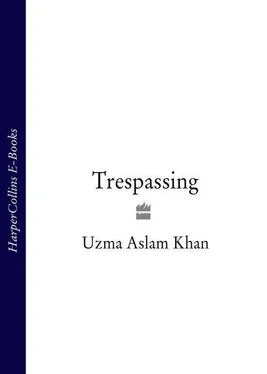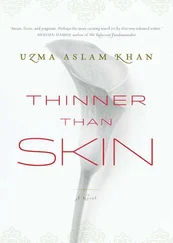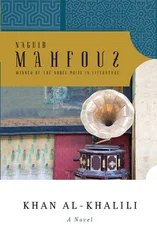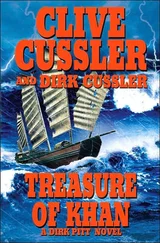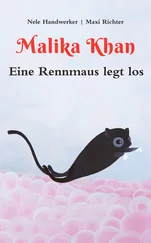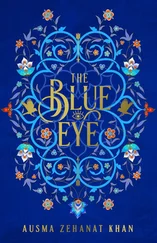‘It’s a small world,’ said Muhammad Shah, in Urdu again. ‘From Amreeka to the Soviets, we all meet here.’
‘From the mountains to the sea, where black fish like you breed,’ said Hero.
If there was a fight, Salaamat missed it. While losing consciousness, he crumpled to the floor, believing he dived down the neck of a vase, into a vast blue bowl.
When he came to, Salaamat’s head was an inferno. He touched it: his fingers came away sticky. Squinting, he saw he lay in the middle of a street in flames. Tires burned. A mob threw stones. He crawled onto the pavement behind him, seeking a door to duck inside. But there was only broken glass, burning carts, people scrambling, and the sound of shotguns. Shops had their shutters securely down. Those that didn’t were being smashed. He tried to stand up. Stumbling down the street, he vaguely recalled a different world of glass.
The stench of charred rubber mingled with singed hair, food and plastic, and his stomach heaved. A dismembered car stood deserted in the middle of the road, the holes where doors had been yawning, screaming. He remembered the maze. And the tea. He reached into his shirt pocket: the bills were gone. In their place was a scrap of paper. When he opened it, a pair of silver earrings inlaid with blue lapis lazuli fell into his hand. The ones he’d wanted. The paper had a phone number. He remembered the two dark faces who spoke his tongue. And the three pale men on stools. And the one he’d never seen at the back, making the tea. Which had stolen his first earnings?
Three years of drudgery, three with no home or family, three listening to Handsome’s men jeer him. And now this. Hadn’t God thrown enough humiliation his way? He turned back. But then he paused: to get to Hero’s shop, he’d have to pass the mob.
When a man ran by him, he grabbed his arm and demanded, ‘What’s happening?’ His face was seared and oily. He must look like that.
‘You should be heading that way,’ the man said, pointing away from the building with Hero’s shop. He pulled away.
Slowly, Salaamat followed. I’ll be back, he swore.
When the next shot rang he found himself wondering which kind of gun had fired it. He’d never known each could be so different. Some shapes were finer than others, and the finish varied greatly, just like in bus-body-making. But when instead of a single shot, he heard a burst of several dozen in succession, he remembered the machine guns. Salaamat began to run.
An old man’s face shone an eerie green in the last glare of the fire that consumed the bus.
‘It was a nice one,’ muttered a youth beside him. ‘New. Not even two weeks old. There was a big ant there,’ he pointed at the fender.
Salaamat knew before he’d even reached it. Maybe because of the purple strip a child kicked all the way down the street — the only part that survived. Or maybe he’d simply heard death in the smoke that swished toward him. It smelled different this time, different from all the burned rubber he’d walked past to get to the bus stop. Maybe it was the smell of premonition. His entire life had been pointing to this moment. He was a fool not to see it before. He was always meant to stand here, at this junction.
There was no turtle now. The paint, metal, and pictures were all singed and furled. Only one wooden plank still burned. Orange flames rose around it half-heartedly. They’d bored into the iron, shattered the disco lights, stripped the plastic seats, gorged the tinted windows, blackened the silver steering wheel.
Salaamat walked around his bus. His. His months of barely any sleep; his runny eyes; his hands sliced by steel; his glittery fish; his Rani; his chronology. His first income, also gone. He kicked the front tires. Smoke permeated every cell in his body. He shut his eyes, overcome by an exhaustion that was absolute. There was not one thing around him that suggested the order he’d slogged to construct since the day he’d left his village. No, before that: since the trawlers and his attack. His father’s cowardice. His mother’s silent humiliation. Her death. Or maybe even earlier. Maybe the lines on his hands, if he could read them, told that it had all gone wrong at his birth. That was the real mistake.
There were no beautiful things to focus on in this life. He had to begin another. And he knew now which road would take him there. The scrap of paper in his pocket pressed into his chest. He tossed it in the cinders. But first, he memorized the number.
APRIL 1987
Salaamat visited the farm often after that. Sometimes he rode on buses with torn red seats and sometimes he stood. He noticed little about any of them. He spoke to no commuters. And he paid no attention to the daily strikes or the burgeoning body count.
‘I won’t be seeing you for a while,’ he said to Sumbul one morning in mid-April. She sat under a mulberry tree, feeding her second child.
The last time he’d been held like a baby was the day his grandmother found him drifting in the sea. She’d rocked him after his uncles pumped his chest. And she’d sung, just like Sumbul sang now.
She buttoned up her shirt but he glimpsed a nipple twice the size of a Fanta bottle cap. She was only fifteen. She, who’d been flat as a coastline and lithe as a fish. A strand of hair strayed loose from her braid. He gently arranged it behind her ear, grazing her earlobe, where a thin ring hung. ‘Remember how you screamed when Dadi put those in?’
‘I thought she’d pierced my heart and I’d bleed to death! If I’d known then what God still had planned for me, I’d have screamed a thousand times louder.’ She laughed.
He reached into his pocket. ‘These are for you.’ He placed the lapis earrings on the baby’s cheek. He’d been saving them for this last visit before he joined Fatah and his men. He’d gotten his money back too, and much more besides.
Sumbul gasped, holding the earrings up for inspection. ‘Where did you get them?’
Salaamat carefully removed the old circles from her ears. ‘Do you like them?’
‘Of course,’ she laughed. ‘They’re beautiful. And they must have cost a fortune.’
‘Shake your head.’ She did. ‘They were made for you,’ he smiled, admiring how her creamy brown neck offset the smooth dark stones. ‘You need a mirror.’
She leaned forward and kissed his cheek. ‘I can see my pretty gift in your pretty eyes and need no mirror.’
They sat quietly awhile. Around him rose other trees planted soon after his family had come to the farm. It was they who’d sowed the seedlings, watered and pruned them, stood guard outside, and helped raise the caterpillars in the shed opposite from where he now sat. Sumbul would go from feeding the baby to feeding the silkworms. But he never went inside the shed. The white wriggling bodies reminded him of the shrimp his mother had spent her last years peeling.
‘Are you happy here?’ He turned to Sumbul.
She cuffed him lightly. ‘You always ask me that. I always tell you yes. They are good people.’
‘But you work with grub,’ he snarled.
‘There’s nothing wrong with that. It’s honest work. And Aba’s treated kindly at the house. Their daughter’s really taken to him.’
Trying to appear casual, Salaamat asked, ‘Is she here today?’
‘My poor lovesick brother,’ Sumbul pinched his cheek. The baby lay in the crook of her crossed knee. Wiping the girl’s chin with the folds of her shalwar, she continued, ‘Instead of asking after rich girls, you should ask after your ageing father.’
Читать дальше
Конец ознакомительного отрывка
Купить книгу
